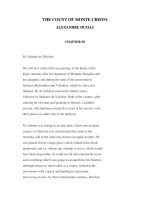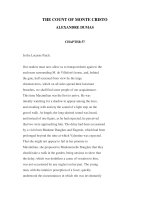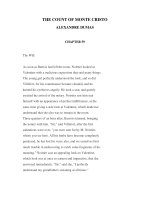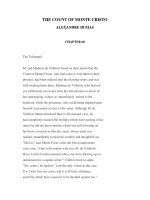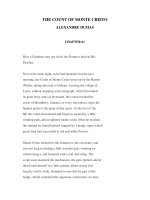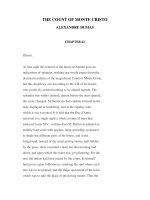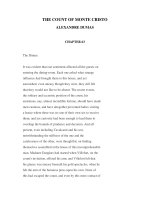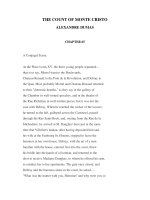LUYỆN ĐỌC TIẾNG ANH QUA CÁC TÁC PHẨM VĂN HỌC -THE COUNT OF MONTE CRISTO ALEXANDRE DUMAS CHAPTER 78-P2 pptx
Bạn đang xem bản rút gọn của tài liệu. Xem và tải ngay bản đầy đủ của tài liệu tại đây (41.15 KB, 19 trang )
THE COUNT OF MONTE CRISTO
ALEXANDRE DUMAS
CHAPTER 78-P2
"What would you have, my dear viscount?" said Monte Cristo,
wiping his hands on the towel which Ali had brought him; "I
must occupy my leisure moments in some way or other. But
come, I am waiting for you." Both men entered Monte Cristo's
carriage, which in the course of a few minutes deposited
them safely at No. 30. Monte Cristo took Albert into his
study, and pointing to a seat, placed another for himself.
"Now let us talk the matter over quietly," said the count.
"You see I am perfectly composed," said Albert.
"With whom are you going to fight?"
"With Beauchamp."
"One of your friends!"
"Of course; it is always with friends that one fights."
"I suppose you have some cause of quarrel?"
"I have."
"What has he done to you?"
"There appeared in his journal last night but wait, and
read for yourself." And Albert handed over the paper to the
count, who read as follows:
"A correspondent at Yanina informs us of a fact of which
until now we had remained in ignorance. The castle which
formed the protection of the town was given up to the Turks
by a French officer named Fernand, in whom the grand vizier,
Ali Tepelini, had reposed the greatest confidence."
"Well," said Monte Cristo, "what do you see in that to annoy
you?"
"What do I see in it?"
"Yes; what does it signify to you if the castle of Yanina
was given up by a French officer?"
"It signifies to my father, the Count of Morcerf, whose
Christian name is Fernand!"
"Did your father serve under Ali Pasha?"
"Yes; that is to say, he fought for the independence of the
Greeks, and hence arises the calumny."
"Oh, my dear viscount, do talk reason!"
"I do not desire to do otherwise."
"Now, just tell me who the devil should know in France that
the officer Fernand and the Count of Morcerf are one and the
same person? and who cares now about Yanina, which was taken
as long ago as the year 1822 or 1823?"
"That just shows the meanness of this slander. They have
allowed all this time to elapse, and then all of a sudden
rake up events which have been forgotten to furnish
materials for scandal, in order to tarnish the lustre of our
high position. I inherit my father's name, and I do not
choose that the shadow of disgrace should darken it. I am
going to Beauchamp, in whose journal this paragraph appears,
and I shall insist on his retracting the assertion before
two witnesses."
"Beauchamp will never retract."
"Then he must fight."
"No he will not, for he will tell you, what is very true,
that perhaps there were fifty officers in the Greek army
bearing the same name."
"We will fight, nevertheless. I will efface that blot on my
father's character. My father, who was such a brave soldier,
whose career was so brilliant"
"Oh, well, he will add, `We are warranted in believing that
this Fernand is not the illustrious Count of Morcerf, who
also bears the same Christian name.'"
"I am determined not to be content with anything short of an
entire retractation."
"And you intend to make him do it in the presence of two
witnesses, do you?"
"Yes."
"You do wrong."
"Which means, I suppose, that you refuse the service which I
asked of you?"
"You know my theory regarding duels; I told you my opinion
on that subject, if you remember, when we were at Rome."
"Nevertheless, my dear count, I found you this morning
engaged in an occupation but little consistent with the
notions you profess to entertain."
"Because, my dear fellow, you understand one must never be
eccentric. If one's lot is cast among fools, it is necessary
to study folly. I shall perhaps find myself one day called
out by some harebrained scamp, who has no more real cause of
quarrel with me than you have with Beauchamp; he may take me
to task for some foolish trifle or other, he will bring his
witnesses, or will insult me in some public place, and I am
expected to kill him for all that."
"You admit that you would fight, then? Well, if so, why do
you object to my doing so?"
"I do not say that you ought not to fight, I only say that a
duel is a serious thing, and ought not to be undertaken
without due reflection."
"Did he reflect before he insulted my father?"
"If he spoke hastily, and owns that he did so, you ought to
be satisfied."
"Ah, my dear count, you are far too indulgent."
"And you are far too exacting. Supposing, for instance, and
do not be angry at what I am going to say"
"Well."
"Supposing the assertion to be really true?"
"A son ought not to submit to such a stain on his father's
honor."
"Ma foi, we live in times when there is much to which we
must submit."
"That is precisely the fault of the age."
"And do you undertake to reform it?"
"Yes, as far as I am personally concerned."
"Well, you the indeed exacting, my dear fellow!"
"Yes, I own it."
"Are you quite impervious to good advice?"
"Not when it comes from a friend."
"And do you account me that title?"
"Certainly I do."
"Well, then, before going to Beauchamp with your witnesses,
seek further information on the subject."
"From whom?"
"From Haidee."
"Why, what can be the use of mixing a woman up in the
affair? what can she do in it?"
"She can declare to you, for example, that your father had
no hand whatever in the defeat and death of the vizier; or
if by chance he had, indeed, the misfortune to"
"I have told you, my dear count, that I would not for one
moment admit of such a proposition."
"You reject this means of information, then?"
"I do most decidedly."
"Then let me offer one more word of advice."
"Do so, then, but let it be the last."
"You do not wish to hear it, perhaps?"
"On the contrary, I request it."
"Do not take any witnesses with you when you go to Beauchamp
visit him alone."
"That would be contrary to all custom."
"Your case is not an ordinary one."
"And what is your reason for advising me to go alone?"
"Because then the affair will rest between you and
Beauchamp."
"Explain yourself."
"I will do so. If Beauchamp be disposed to retract, you
ought at least to give him the opportunity of doing it of
his own free will, the satisfaction to you will be the
same. If, on the contrary, he refuses to do so, it will then
be quite time enough to admit two strangers into your
secret."
"They will not be strangers, they will be friends."
"Ah, but the friends of to-day are the enemies of to-morrow;
Beauchamp, for instance."
"So you recommend"
"I recommend you to be prudent."
"Then you advise me to go alone to Beauchamp?"
"I do, and I will tell you why. When you wish to obtain some
concession from a man's self-love, you must avoid even the
appearance of wishing to wound it."
"I believe you are right."
"I am glad of it."
"Then I will go alone."
"Go; but you would do better still by not going at all."
"That is impossible."
"Do so, then; it will be a wiser plan than the first which
you proposed."
"But if, in spite of all my precautions, I am at last
obliged to fight, will you not be my second?"
"My dear viscount," said Monte Cristo gravely, "you must
have seen before to-day that at all times and in all places
I have been at your disposal, but the service which you have
just demanded of me is one which it is out of my power to
render you."
"Why?"
"Perhaps you may know at some future period, and in the mean
time I request you to excuse my declining to put you in
possession of my reasons."
"Well, I will have Franz and Chateau-Renaud; they will be
the very men for it."
"Do so, then."
"But if I do fight, you will surely not object to giving me
a lesson or two in shooting and fencing?"
"That, too, is impossible."
"What a singular being you are! you will not interfere in
anything."
"You are right that is the principle on which I wish to
act."
"We will say no more about it, then. Good-by, count."
Morcerf took his hat, and left the room. He found his
carriage at the door, and doing his utmost to restrain his
anger he went at once to find Beauchamp, who was in his
office. It was a gloomy, dusty-looking apartment, such as
journalists' offices have always been from time immemorial.
The servant announced M. Albert de Morcerf. Beauchamp
repeated the name to himself, as though he could scarcely
believe that he had heard aright, and then gave orders for
him to be admitted. Albert entered. Beauchamp uttered an
exclamation of surprise on seeing his friend leap over and
trample under foot all the newspapers which were strewed
about the room. "This way, this way, my dear Albert!" said
he, holding out his hand to the young man. "Are you out of
your senses, or do you come peaceably to take breakfast with
me? Try and find a seat there is one by that geranium,
which is the only thing in the room to remind me that there
are other leaves in the world besides leaves of paper."
"Beauchamp," said Albert, "it is of your journal that I come
to speak."
"Indeed? What do you wish to say about it?"
"I desire that a statement contained in it should be
rectified."
"To what do you refer? But pray sit down."
"Thank you," said Albert, with a cold and formal bow.
"Will you now have the kindness to explain the nature of the
statement which has displeased you?"
"An announcement has been made which implicates the honor of
a member of my family."
"What is it?" said Beauchamp, much surprised; "surely you
must be mistaken."
"The story sent you from Yanina."
"Yanina?"
"Yes; really you appear to be totally ignorant of the cause
which brings me here."
"Such is really the case, I assure you, upon my honor!
Baptiste, give me yesterday's paper," cried Beauchamp.
"Here, I have brought mine with me," replied Albert.
Beauchamp took the paper, and read the article to which
Albert pointed in an undertone. "You see it is a serious
annoyance," said Morcerf, when Beauchamp had finished the
perusal of the paragraph. "Is the officer referred to a
relation of yours, then?" demanded the journalist.
"Yes," said Albert, blushing.
"Well, what do you wish me to do for you?" said Beauchamp
mildly.
"My dear Beauchamp, I wish you to contradict this
statement." Beauchamp looked at Albert with a benevolent
expression.
"Come," said he, "this matter will want a good deal of
talking over; a retractation is always a serious thing, you
know. Sit down, and I will read it again." Albert resumed
his seat, and Beauchamp read, with more attention than at
first, the lines denounced by his friend. "Well," said
Albert in a determined tone, "you see that your paper his
insulted a member of my family, and I insist on a
retractation being made."
"You insist?"
"Yes, I insist."
"Permit me to remind you that you are not in the Chamber, my
dear Viscount."
"Nor do I wish to be there," replied the young man, rising.
"I repeat that I am determined to have the announcement of
yesterday contradicted. You have known me long enough,"
continued Albert, biting his lips convulsively, for he saw
that Beauchamp's anger was beginning to rise, "you have
been my friend, and therefore sufficiently intimate with me
to be aware that I am likely to maintain my resolution on
this point."
"If I have been your friend, Morcerf, your present manner of
speaking would almost lead me to forget that I ever bore
that title. But wait a moment, do not let us get angry, or
at least not yet. You are irritated and vexed tell me how
this Fernand is related to you?"
"He is merely my father," said Albert "M. Fernand
Mondego, Count of Morcerf, an old soldier who has fought in
twenty battles and whose honorable scars they would denounce
as badges of disgrace."
"Is it your father?" said Beauchamp; "that is quite another
thing. Then can well understand your indignation, my dear
Albert. I will look at it again;" and he read the paragraph
for the third time, laying a stress on each word as he
proceeded. "But the paper nowhere identifies this Fernand
with your father."
"No; but the connection will be seen by others, and
therefore I will have the article contradicted." At the
words "I will," Beauchamp steadily raised his eyes to
Albert's countenance, and then as gradually lowering them,
he remained thoughtful for a few moments. "You will retract
this assertion, will you not, Beauchamp?" said Albert with
increased though stifled anger.
"Yes," replied Beauchamp.
"Immediately?" said Albert.
"When I am convinced that the statement is false."
"What?"
"The thing is worth looking into, and I will take pains to
investigate the matter thoroughly."
"But what is there to investigate, sir?" said Albert,
enraged beyond measure at Beauchamp's last remark. "If you
do not believe that it is my father, say so immediately; and
if, on the contrary, you believe it to be him, state your
reasons for doing so." Beauchamp looked at Albert with the
smile which was so peculiar to him, and which in its
numerous modifications served to express every varied
emotion of his mind. "Sir," replied he, "if you came to me
with the idea of demanding satisfaction, you should have
gone at once to the point, and not have entertained me with
the idle conversation to which I have been patiently
listening for the last half hour. Am I to put this
construction on your visit?"
"Yes, if you will not consent to retract that infamous
calumny."
"Wait a moment no threats, if you please, M. Fernand
Mondego, Vicomte de Morcerf; I never allow them from my
enemies, and therefore shall not put up with them from my
friends. You insist on my contradicting the article relating
to General Fernand, an article with which, I assure you on
my word of honor, I had nothing whatever to do?"
"Yes, I insist on it," said Albert, whose mind was beginning
to get bewildered with the excitement of his feelings.
"And if I refuse to retract, you wish to fight, do you?"
said Beauchamp in a calm tone.
"Yes," replied Albert, raising his voice.
"Well," said Beauchamp, "here is my answer, my dear sir. The
article was not inserted by me I was not even aware of
it; but you have, by the step you have taken, called my
attention to the paragraph in question, and it will remain
until it shall be either contradicted or confirmed by some
one who has a right to do so."
"Sir," said Albert, rising, "I will do myself the honor of
sending my seconds to you, and you will be kind enough to
arrange with them the place of meeting and the weapons."
"Certainly, my dear sir."
"And this evening, if you please, or to-morrow at the
latest, we will meet."
"No, no, I will be on the ground at the proper time; but in
my opinion (and I have a right to dictate the preliminaries,
as it is I who have received the provocation) in my
opinion the time ought not to be yet. I know you to be well
skilled in the management of the sword, while I am only
moderately so; I know, too, that you are a good marksman
there we are about equal. I know that a duel between us two
would be a serious affair, because you are brave, and I am
brave also. I do not therefore wish either to kill you, or
to be killed myself without a cause. Now, I am going to put
a question to you, and one very much to the purpose too. Do
you insist on this retractation so far as to kill me if I do
not make it, although I have repeated more than once, and
affirmed on my honor, that I was ignorant of the thing with
which you charge me, and although I still declare that it is
impossible for any one but you to recognize the Count of
Morcerf under the name of Fernand?"
"I maintain my original resolution."
"Very well, my dear sir; then I consent to cut throats with
you. But I require three weeks' preparation; at the end of
that time I shall come and say to you, `The assertion is
false, and I retract it,' or `The assertion is true,' when I
shall immediately draw the sword from its sheath, or the
pistols from the case, whichever you please."
"Three weeks!" cried Albert; "they will pass as slowly as
three centuries when I am all the time suffering dishonor."
"Had you continued to remain on amicable terms with me, I
should have said, `Patience, my friend;' but you have
constituted yourself my enemy, therefore I say, `What does
that signify to me, sir?'"
"Well, let it be three weeks then," said Morcerf; "but
remember, at the expiration of that time no delay or
subterfuge will justify you in"
"M. Albert de Morcerf," said Beauchamp, rising in his turn,
"I cannot throw you out of window for three weeks that is
to say, for twenty-four days to come nor have you any
right to split my skull open till that time has elapsed.
To-day is the 29th of August; the 21st of September will,
therefore, be the conclusion of the term agreed on, and till
that time arrives and it is the advice of a gentleman
which I am about to give you till then we will refrain
from growling and barking like two dogs chained within sight
of each other." When he had concluded his speech, Beauchamp
bowed coldly to Albert, turned his back upon him, and went
to the press-room.
Albert vented his anger on a pile of newspapers, which he
sent flying all over the office by switching them violently
with his stick; after which ebullition he departed not,
however, without walking several times to the door of the
press-room, as if he had half a mind to enter. While Albert
was lashing the front of his carriage in the same manner
that he had the newspapers which were the innocent agents of
his discomfiture, as he was crossing the barrier he
perceived Morrel, who was walking with a quick step and a
bright eye. He was passing the Chinese Baths, and appeared
to have come from the direction of the Porte Saint-Martin,
and to be going towards the Madeleine. "Ah," said Morcerf,
"there goes a happy man!" And it so happened Albert was not
mistaken in his opinion.

